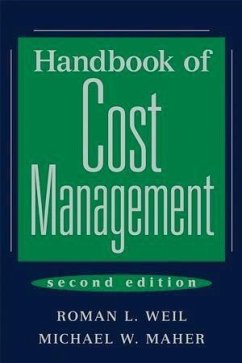Schade – dieser Artikel ist leider ausverkauft. Sobald wir wissen, ob und wann der Artikel wieder verfügbar ist, informieren wir Sie an dieser Stelle.
- Format: PDF
- Merkliste
- Auf die Merkliste
- Bewerten Bewerten
- Teilen
- Produkt teilen
- Produkterinnerung
- Produkterinnerung

Bitte loggen Sie sich zunächst in Ihr Kundenkonto ein oder registrieren Sie sich bei
bücher.de, um das eBook-Abo tolino select nutzen zu können.
Hier können Sie sich einloggen
Hier können Sie sich einloggen
Sie sind bereits eingeloggt. Klicken Sie auf 2. tolino select Abo, um fortzufahren.

Bitte loggen Sie sich zunächst in Ihr Kundenkonto ein oder registrieren Sie sich bei bücher.de, um das eBook-Abo tolino select nutzen zu können.
Handbook of Cost Management, Second Edition covers all of the essential topics in cost management and accounting. It includes conventional topics, such as job costing and cost allocation, as well as such current topics as balanced scorecard, economic value added, logistics and marketing cost, theory of constraints, inter-organizational costing, and the cost of quality.
- Geräte: PC
- eBook Hilfe
Andere Kunden interessierten sich auch für
Handbook of Cost Management, Second Edition covers all of the essential topics in cost management and accounting. It includes conventional topics, such as job costing and cost allocation, as well as such current topics as balanced scorecard, economic value added, logistics and marketing cost, theory of constraints, inter-organizational costing, and the cost of quality.
Produktdetails
- Produktdetails
- Verlag: John Wiley & Sons
- Seitenzahl: 896
- Erscheinungstermin: 31. Mai 2005
- Englisch
- ISBN-13: 9780471722632
- Artikelnr.: 37358901
- Verlag: John Wiley & Sons
- Seitenzahl: 896
- Erscheinungstermin: 31. Mai 2005
- Englisch
- ISBN-13: 9780471722632
- Artikelnr.: 37358901
ROMAN L. WEIL, PhD, CMA, CPA, is V. Duane Rath Professor of Accounting at the Graduate School of Business of the University of Chicago. He is co-director of the Chicago/Wharton/Stanford law School Directors' Consortium. He received his BA in Economics and Mathematics from Yale University in 1962. He received his MS in Industrial Administration in 1965 and PhD in Economics in 1966, both from Carnegie-Mellon University. He joined the faculty at the University of Chicago in 1965, where he has held positions in Mathematical Economics, Management and Information Sciences, Accounting, and in the Law School. He directs the University's Directors' College, which trains corporate board members to do their jobs better; his won specialty in that training focuses on financial literacy. He co-founded The Directors' Consortium, a joint venture of Chicago, Stanford Law School, and The Wharton School. He has been a CPA in Illinois since 1973 and a CMA since 1974. He has served on the faculties of the Georgia Institute of Technology, New York University Law School, and Stanford University in its Graduate School of Business, Economics Department, and Law School. At Stanford, he has, since its inception, organized the sessions at Directors' College on Audit Committee duties. He has served on the Board of Academic Advisors of the U.S. Business School in Prague and has taught there. He has served on the accrediting committee of the American Association of Collegiate Schools of Business. He has designed and implemented continuing education programs for partners at the accounting firms of Andersen and PriceWaterhouseCoopers, as well as for employees at Goldman Sachs, Montgomery Ward, Merck, and William Blair, and for business executives in Great Britain and Singapore. He has served as editor or associate editor of the Accounting Review, Communications of the Association for Computing Machinery, Management Science, Journal of Accounting and Economics, and the Financial Analysts Journal. He has co-edited four professional reference books for McGraw-Hill, Simon Schuster, Prentice Hall, and John Wiley & Sons. He has co-authored more than a dozen textbooks for Holt, Rinehart, and Winston, The Dryden Press, Harcourt, Brace & Jovanovich, and Thomson Lear4ning. He is the senior editor of, and contributor to, the Litigation Services Handbook, now in its third edition. His articles have appeared in Barron's and The Wall Street Journal. He has published more than 80 articles in academic and professional journals. He has served as the principal investigator on various research projects of the National Science Foundation. He served on the Securities and Exchange Commission Advisory Committee on replacement cost Accounting. At the Financial Accounting Standards Board, he has served on two task forces-one on consolidations and the other on interest methods-and on the Financial Accounting Standards Advisory Council. He is a member of the American Accounting Association, the American Economics Association, the American Institute of Certified Public Accountants, the American Law and Economics Association, the Illinois Society of Certified Public Accountants, and the Institute of Management Sciences. He has consulted to governmental agencies, including the U.S. Treasury Department and the Securities and Exchange commission. He has consulted for a variety of private clients.He serves on the board of directors of mutual funds affiliated with New York Life Insurance Company and chairs the Audit Committee. he serves on the Independent Directors Council of the Investment Company Institute, an advisory group for independent directors of mutual funds.
Preface. About the Editors. Contributors. 1. Glossary of Cost Management Concepts (Roman L. Weil). 2. Economic Concepts of Cost in Managerial Accounting (Gordon Shillinglaw and Roman L. Weil). 3. Different Costs for Different Purposes (Russell A. Taussig and Roman L. Weil). 4. Accounting Magic (Roman L. Weil). 5. Mathematical Concepts in Cost Accounting (Joel S. Demski). 6. Activity-Based Costing and Management (Michael W. Maher). 7. Target Costing for New Product Development. 8. Kaizen Costing for Existing Products (Robin Cooper and Regine Slagmulder). 9. Interorganizational Costing (Robin Cooper and Regine Slagmulder). 10. Costs and Benefits of Quality Improvement (Christopher D. Ittner and David F. Larcker). 11. Logistics and Marketing Costs (James M. Reeve). 12. Estimating Cost Behavior (Michael W. Maher and M. Laurentius Marais). 13. Spoilage, Waste, and Scrap, Including Green Accounting (William N. Lanen). 14. Job, Process, and Operations Costing (Michael W. Maher). 15. Standard Costing Systems (James A. Largay III). 16. Allocations of Cost and Revenue (Roman L. Weil) 17. Cost-Volume-Profit Analyses (Nicholas Dopuch and Michael W. Maher). 18. Forecasting Pro Formal Financial Statements (James M. Wahlen). 19. Operating Budgets and Budgeting-Benefits and Costs (Michael D. Shields). 20. Theory of Constraints (Eric Noreen). 21. Capital Budgeting: Concepts and Methods (Roman L. Weil). 22. Capital Budgeting: Implementation (Roman L. Weil). 23. Compound Interest: Concepts and Applications (Roman L. Weil). 24. Performance Evaluation in Decentralized Organizations (Michael W. Maher). 25. The Balanced Scorecard and Nonfinancial Performance Measures (Michael W. Maher). 26. Economic Value Added (EVA®) (James J. Wallace). 27. Transfer Pricing (Michael W. Maher). 28. A Managerial Accounting Guide for Nonprofit Managers (Leslie G. Eldenburg and Naomi Soderstrom). 29. Introduction to Costs in Litigation (Elizabeth A. Evans). 30. The Historical Development of Management Accounting (Richard Vangermeersch and Henry R. Schwarzbach). 31. Corporate Scandals: The Accounting Underpinnings (Kathleen Fitzgerald and Roman L. Weil). Appendix: Compound Interest, Present Value, and Annuity Tables. Index.
Preface. About the Editors. Contributors. Chapter 1. Glossary of Cost
Management Concepts (Roman L. Weil). Chapter 2. Economic Concepts of Cost
in Managerial Accounting (Gordon Shillinglaw and Roman L. Weil). Chapter 3.
Different Costs for Different Purposes (Russell A. Taussig and Roman L.
Weil). Chapter 4. Accounting Magic (Roman L. Weil). Chapter 5. Mathematical
Concepts in Cost Accounting (Joel S. Demski). Chapter 6. Activity-Based
Costing and Management (Michael W. Maher). Chapter 7. Target Costing for
New Product Development. Chapter 8. Kaizen Costing for Existing Products
(Robin Cooper and Regine Slagmulder). Chapter 9. Interorganizational
Costing (Robin Cooper and Regine Slagmulder). Chapter 10. Costs and
Benefits of Quality Improvement (Christopher D. Ittner and David F.
Larcker). Chapter 11. Logistics and Marketing Costs (James M. Reeve).
Chapter 12. Estimating Cost Behavior (Michael W. Maher and M. Laurentius
Marais). Chapter 13. Spoilage, Waste, and Scrap, Including Green Accounting
(William N. Lanen). Chapter 14. Job, Process, and Operations Costing
(Michael W. Maher). Chapter 15. Standard Costing Systems (James A. Largay
III). Chapter 16. Allocations of Cost and Revenue (Roman L. Weil) Chapter
17. Cost-Volume-Profit Analyses (Nicholas Dopuch and Michael W. Maher).
Chapter 18. Forecasting Pro Formal Financial Statements (James M. Wahlen).
Chapter 19. Operating Budgets and Budgeting-Benefits and Costs (Michael D.
Shields). Chapter 20. Theory of Constraints (Eric Noreen). Chapter 21.
Capital Budgeting: Concepts and Methods (Roman L. Weil). Chapter 22.
Capital Budgeting: Implementation (Roman L. Weil). Chapter 23. Compound
Interest: Concepts and Applications (Roman L. Weil). Chapter 24.
Performance Evaluation in Decentralized Organizations (Michael W. Maher).
Chapter 25. The Balanced Scorecard and Nonfinancial Performance Measures
(Michael W. Maher). Chapter 26. Economic Value Added (EVA(r)) (James J.
Wallace). Chapter 27. Transfer Pricing (Michael W. Maher). Chapter 28. A
Managerial Accounting Guide for Nonprofit Managers (Leslie G. Eldenburg and
Naomi Soderstrom). Chapter 29. Introduction to Costs in Litigation
(Elizabeth A. Evans). Chapter 30. The Historical Development of Management
Accounting (Richard Vangermeersch and Henry R. Schwarzbach). Chapter 31.
Corporate Scandals: The Accounting Underpinnings (Kathleen Fitzgerald and
Roman L. Weil). Appendix A. Value Tables. Index.
Management Concepts (Roman L. Weil). Chapter 2. Economic Concepts of Cost
in Managerial Accounting (Gordon Shillinglaw and Roman L. Weil). Chapter 3.
Different Costs for Different Purposes (Russell A. Taussig and Roman L.
Weil). Chapter 4. Accounting Magic (Roman L. Weil). Chapter 5. Mathematical
Concepts in Cost Accounting (Joel S. Demski). Chapter 6. Activity-Based
Costing and Management (Michael W. Maher). Chapter 7. Target Costing for
New Product Development. Chapter 8. Kaizen Costing for Existing Products
(Robin Cooper and Regine Slagmulder). Chapter 9. Interorganizational
Costing (Robin Cooper and Regine Slagmulder). Chapter 10. Costs and
Benefits of Quality Improvement (Christopher D. Ittner and David F.
Larcker). Chapter 11. Logistics and Marketing Costs (James M. Reeve).
Chapter 12. Estimating Cost Behavior (Michael W. Maher and M. Laurentius
Marais). Chapter 13. Spoilage, Waste, and Scrap, Including Green Accounting
(William N. Lanen). Chapter 14. Job, Process, and Operations Costing
(Michael W. Maher). Chapter 15. Standard Costing Systems (James A. Largay
III). Chapter 16. Allocations of Cost and Revenue (Roman L. Weil) Chapter
17. Cost-Volume-Profit Analyses (Nicholas Dopuch and Michael W. Maher).
Chapter 18. Forecasting Pro Formal Financial Statements (James M. Wahlen).
Chapter 19. Operating Budgets and Budgeting-Benefits and Costs (Michael D.
Shields). Chapter 20. Theory of Constraints (Eric Noreen). Chapter 21.
Capital Budgeting: Concepts and Methods (Roman L. Weil). Chapter 22.
Capital Budgeting: Implementation (Roman L. Weil). Chapter 23. Compound
Interest: Concepts and Applications (Roman L. Weil). Chapter 24.
Performance Evaluation in Decentralized Organizations (Michael W. Maher).
Chapter 25. The Balanced Scorecard and Nonfinancial Performance Measures
(Michael W. Maher). Chapter 26. Economic Value Added (EVA(r)) (James J.
Wallace). Chapter 27. Transfer Pricing (Michael W. Maher). Chapter 28. A
Managerial Accounting Guide for Nonprofit Managers (Leslie G. Eldenburg and
Naomi Soderstrom). Chapter 29. Introduction to Costs in Litigation
(Elizabeth A. Evans). Chapter 30. The Historical Development of Management
Accounting (Richard Vangermeersch and Henry R. Schwarzbach). Chapter 31.
Corporate Scandals: The Accounting Underpinnings (Kathleen Fitzgerald and
Roman L. Weil). Appendix A. Value Tables. Index.
Preface. About the Editors. Contributors. 1. Glossary of Cost Management Concepts (Roman L. Weil). 2. Economic Concepts of Cost in Managerial Accounting (Gordon Shillinglaw and Roman L. Weil). 3. Different Costs for Different Purposes (Russell A. Taussig and Roman L. Weil). 4. Accounting Magic (Roman L. Weil). 5. Mathematical Concepts in Cost Accounting (Joel S. Demski). 6. Activity-Based Costing and Management (Michael W. Maher). 7. Target Costing for New Product Development. 8. Kaizen Costing for Existing Products (Robin Cooper and Regine Slagmulder). 9. Interorganizational Costing (Robin Cooper and Regine Slagmulder). 10. Costs and Benefits of Quality Improvement (Christopher D. Ittner and David F. Larcker). 11. Logistics and Marketing Costs (James M. Reeve). 12. Estimating Cost Behavior (Michael W. Maher and M. Laurentius Marais). 13. Spoilage, Waste, and Scrap, Including Green Accounting (William N. Lanen). 14. Job, Process, and Operations Costing (Michael W. Maher). 15. Standard Costing Systems (James A. Largay III). 16. Allocations of Cost and Revenue (Roman L. Weil) 17. Cost-Volume-Profit Analyses (Nicholas Dopuch and Michael W. Maher). 18. Forecasting Pro Formal Financial Statements (James M. Wahlen). 19. Operating Budgets and Budgeting-Benefits and Costs (Michael D. Shields). 20. Theory of Constraints (Eric Noreen). 21. Capital Budgeting: Concepts and Methods (Roman L. Weil). 22. Capital Budgeting: Implementation (Roman L. Weil). 23. Compound Interest: Concepts and Applications (Roman L. Weil). 24. Performance Evaluation in Decentralized Organizations (Michael W. Maher). 25. The Balanced Scorecard and Nonfinancial Performance Measures (Michael W. Maher). 26. Economic Value Added (EVA®) (James J. Wallace). 27. Transfer Pricing (Michael W. Maher). 28. A Managerial Accounting Guide for Nonprofit Managers (Leslie G. Eldenburg and Naomi Soderstrom). 29. Introduction to Costs in Litigation (Elizabeth A. Evans). 30. The Historical Development of Management Accounting (Richard Vangermeersch and Henry R. Schwarzbach). 31. Corporate Scandals: The Accounting Underpinnings (Kathleen Fitzgerald and Roman L. Weil). Appendix: Compound Interest, Present Value, and Annuity Tables. Index.
Preface. About the Editors. Contributors. Chapter 1. Glossary of Cost
Management Concepts (Roman L. Weil). Chapter 2. Economic Concepts of Cost
in Managerial Accounting (Gordon Shillinglaw and Roman L. Weil). Chapter 3.
Different Costs for Different Purposes (Russell A. Taussig and Roman L.
Weil). Chapter 4. Accounting Magic (Roman L. Weil). Chapter 5. Mathematical
Concepts in Cost Accounting (Joel S. Demski). Chapter 6. Activity-Based
Costing and Management (Michael W. Maher). Chapter 7. Target Costing for
New Product Development. Chapter 8. Kaizen Costing for Existing Products
(Robin Cooper and Regine Slagmulder). Chapter 9. Interorganizational
Costing (Robin Cooper and Regine Slagmulder). Chapter 10. Costs and
Benefits of Quality Improvement (Christopher D. Ittner and David F.
Larcker). Chapter 11. Logistics and Marketing Costs (James M. Reeve).
Chapter 12. Estimating Cost Behavior (Michael W. Maher and M. Laurentius
Marais). Chapter 13. Spoilage, Waste, and Scrap, Including Green Accounting
(William N. Lanen). Chapter 14. Job, Process, and Operations Costing
(Michael W. Maher). Chapter 15. Standard Costing Systems (James A. Largay
III). Chapter 16. Allocations of Cost and Revenue (Roman L. Weil) Chapter
17. Cost-Volume-Profit Analyses (Nicholas Dopuch and Michael W. Maher).
Chapter 18. Forecasting Pro Formal Financial Statements (James M. Wahlen).
Chapter 19. Operating Budgets and Budgeting-Benefits and Costs (Michael D.
Shields). Chapter 20. Theory of Constraints (Eric Noreen). Chapter 21.
Capital Budgeting: Concepts and Methods (Roman L. Weil). Chapter 22.
Capital Budgeting: Implementation (Roman L. Weil). Chapter 23. Compound
Interest: Concepts and Applications (Roman L. Weil). Chapter 24.
Performance Evaluation in Decentralized Organizations (Michael W. Maher).
Chapter 25. The Balanced Scorecard and Nonfinancial Performance Measures
(Michael W. Maher). Chapter 26. Economic Value Added (EVA(r)) (James J.
Wallace). Chapter 27. Transfer Pricing (Michael W. Maher). Chapter 28. A
Managerial Accounting Guide for Nonprofit Managers (Leslie G. Eldenburg and
Naomi Soderstrom). Chapter 29. Introduction to Costs in Litigation
(Elizabeth A. Evans). Chapter 30. The Historical Development of Management
Accounting (Richard Vangermeersch and Henry R. Schwarzbach). Chapter 31.
Corporate Scandals: The Accounting Underpinnings (Kathleen Fitzgerald and
Roman L. Weil). Appendix A. Value Tables. Index.
Management Concepts (Roman L. Weil). Chapter 2. Economic Concepts of Cost
in Managerial Accounting (Gordon Shillinglaw and Roman L. Weil). Chapter 3.
Different Costs for Different Purposes (Russell A. Taussig and Roman L.
Weil). Chapter 4. Accounting Magic (Roman L. Weil). Chapter 5. Mathematical
Concepts in Cost Accounting (Joel S. Demski). Chapter 6. Activity-Based
Costing and Management (Michael W. Maher). Chapter 7. Target Costing for
New Product Development. Chapter 8. Kaizen Costing for Existing Products
(Robin Cooper and Regine Slagmulder). Chapter 9. Interorganizational
Costing (Robin Cooper and Regine Slagmulder). Chapter 10. Costs and
Benefits of Quality Improvement (Christopher D. Ittner and David F.
Larcker). Chapter 11. Logistics and Marketing Costs (James M. Reeve).
Chapter 12. Estimating Cost Behavior (Michael W. Maher and M. Laurentius
Marais). Chapter 13. Spoilage, Waste, and Scrap, Including Green Accounting
(William N. Lanen). Chapter 14. Job, Process, and Operations Costing
(Michael W. Maher). Chapter 15. Standard Costing Systems (James A. Largay
III). Chapter 16. Allocations of Cost and Revenue (Roman L. Weil) Chapter
17. Cost-Volume-Profit Analyses (Nicholas Dopuch and Michael W. Maher).
Chapter 18. Forecasting Pro Formal Financial Statements (James M. Wahlen).
Chapter 19. Operating Budgets and Budgeting-Benefits and Costs (Michael D.
Shields). Chapter 20. Theory of Constraints (Eric Noreen). Chapter 21.
Capital Budgeting: Concepts and Methods (Roman L. Weil). Chapter 22.
Capital Budgeting: Implementation (Roman L. Weil). Chapter 23. Compound
Interest: Concepts and Applications (Roman L. Weil). Chapter 24.
Performance Evaluation in Decentralized Organizations (Michael W. Maher).
Chapter 25. The Balanced Scorecard and Nonfinancial Performance Measures
(Michael W. Maher). Chapter 26. Economic Value Added (EVA(r)) (James J.
Wallace). Chapter 27. Transfer Pricing (Michael W. Maher). Chapter 28. A
Managerial Accounting Guide for Nonprofit Managers (Leslie G. Eldenburg and
Naomi Soderstrom). Chapter 29. Introduction to Costs in Litigation
(Elizabeth A. Evans). Chapter 30. The Historical Development of Management
Accounting (Richard Vangermeersch and Henry R. Schwarzbach). Chapter 31.
Corporate Scandals: The Accounting Underpinnings (Kathleen Fitzgerald and
Roman L. Weil). Appendix A. Value Tables. Index.


